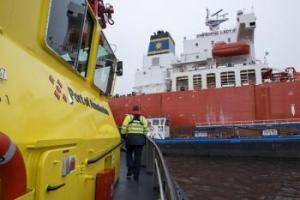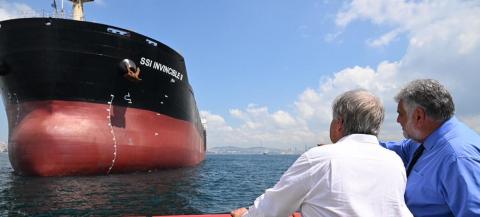Harbour Master
Harbour Masters
Worldwide there are approximately 3,000 merchant ports and the work of the Harbour Master can vary widely from country to country and from port to port even within the same country.


Completing his trip to Europe on 20 August UN SG António Guterres oversaw the departure of two ships involved in the Black Sea Grain Initiative, a UN-brokered operation to bring urgently needed hunger relief to the Horn of Africa.
Mr Guterres flew into Istanbul on the morning of 20 August from Chisinau, Moldova – where he hosted a working dinner with President Maia Sandu the previous evening – and boarded a pilot boat in the Sea of Marmara, where he sailed by mv Brave Commander, the World Food Programme (WFP) ship which had loaded more than 23,000 tonnes of wheat in the port of Yuzhny / Pivdennyi, before making passage to deliver the precious cargo to the Horn of Africa, to help people on the verge of famine.
The Secretary-General, along with a group of inspectors from the Black Sea Grain Initiative UN Joint Coordination Centre for the Initiative (JCC), boarded the vessel SSI Invincible II. This ship was on its way to Chornomorsk in Ukraine to load close to 50,000 tonnes of grain – the largest shipment to leave Ukraine since the start of the war.
Joined by the Turkish Minister of Defence, Hulusi Akar, the Secretary-General toured the Joint Coordination Center. He met the Russian and Ukrainian delegations to the JCC separately, and then for an official session of the JCC, where he thanked all the participants for their professionalism and humanity in ensuring that this initiative is a success for people around the world.
Pivotal role of Türkiye
In a press conference with Minister Akar, the Secretary-General thanked the government of Türkiye for their pivotal role in the Black Sea Grain Initiative.
The collaborative work of the teams sitting around the table at the JCC embodies what we can achieve with political will, top operational expertise, and collective effort, Mr. Guterres told journalists.
He described the ships that he had just seen in the Marmara Sea and Istanbul as only the more visible part of the solution. The other part of this package deal, he said, is the unimpeded access to the global markets of Russian food and fertilizer, which are not subject to sanctions.
The UN SG remarked: ‘Without fertilizer in 2022, there may not be enough food in 2023. Getting more food and fertilizer out of Ukraine and Russia is critical to further calm commodity markets and lower prices for consumers.’
The Secretary-General’s trip began on 17 August, when he arrived in Lviv, Ukraine, having travelled from New York via Warsaw.
Prior to a trilateral meeting with President Volodymyr Zelensky of Ukraine and President of Recep Tayyip Erdoğan of Türkiye, the Secretary-General briefly visited the Ivan Franko National University of Lviv. He was greeted, and given a tour, by Volodymyr Melnyk, the rector of the university, which is considered a centre for the study of human rights.
Mr Melnyk explained the important contributions to the world’s science, international law and diplomacy made by the university and its scholars. One of the graduates of the School of International Law, Louis Son, is co-author of the UN Charter and Raphael Lemkin, another graduate, coined the term genocide.
Students from this University were later judges in the International Criminal Court or nominated for Nobel Prizes, including Jan Karski, the famous Polish diplomat who alerted the world to the on-going holocaust during the Second World War.
At the time of writing the UN chief was on his way back to New York.
Picture caption
In the Sea of Marmara, UN Secretary-General António Guterres observes the WFP ship SSI Invincible II, headed to Ukraine to pick up the largest cargo of grain yet exported under the Black Sea Grain Initiative.
UN Photo/Mark Garten©.
Founded in 2017, MarineLabs delivers high-resolution, real-time, and historical wind, wave, and weather data, as well as hyper-local 10-day forecasting, from a growing network of cloud-connected, rugged sensor nodes.
The International Harbour Masters Association (IHMA) and the Port of Rotterdam Authority are pleased to announce the 15th International Harbour Masters Association Congress, to be held from 09–12 June 2026 at Theater Zuidplein in Rotterdam.